The digital transformation of the healthcare industry began a few years ago and has been growing ever since. Especially during the pandemic, people cannot get access to hospitals or are afraid of visiting them due to the higher possibility of getting ill. Some areas simply do not have hospitals nearby and residents of rural or remote areas do not have access to healthcare services. At the same time, healthcare facilities spend an excessive amount of time and money on accommodating patients’ needs and often struggle to deliver the best care. This is where healthcare application development comes into play and changes the game. Now people can download an app, get an appointment with a physician and receive help over texts or video calls.
It is evident that the market is expanding and is expected to grow by 17.7% by 2028. Not only do healthcare apps help people in need to get medical advice, but they also reduce the workload of physicians and nurses, automate internal processes, and digitize the industry as a whole. In this article, we will talk about the various types of healthcare software solutions, discuss the process of healthcare application development, as well as investigate the costs of creating such apps.

Mobile apps for healthcare are software solutions that aspire to streamline and simplify physicians’ and patients’ lives. They can track health data and help doctors give accurate diagnoses, provide limitless access to clinicians at any time and location, offer healthcare-related tips to the general public, streamline prescription management, and more.
Before we talk about healthcare mobile application development, let’s discuss the benefits.
What are the benefits that doctors and patients gain from shifting to the digital healthcare world? Let’s take a closer look at the most significant advantages that patients and clinicians can receive from using various mobile medical solutions.
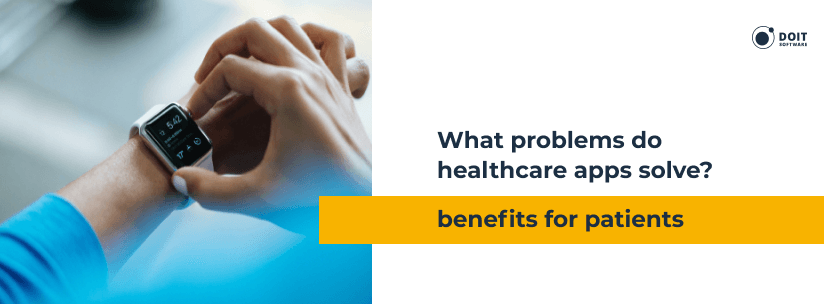
Patients can receive a variety of benefits due to healthcare application development:
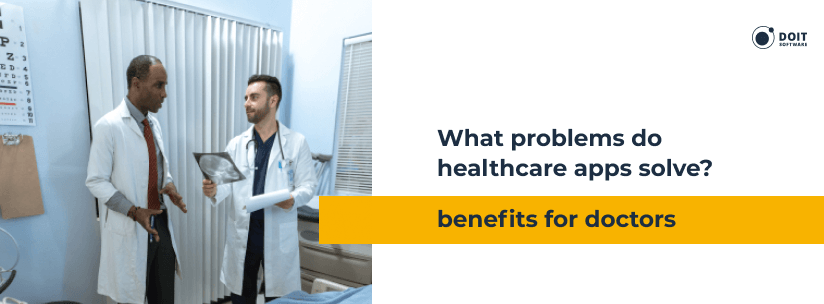
Physicians and other hospital workers get the following advantages through healthcare mobile application development:
What constitutes a successful healthcare application? Let’s investigate the top five mHealth apps and determine why they have become popular, and replicate their success in your medical app development process.
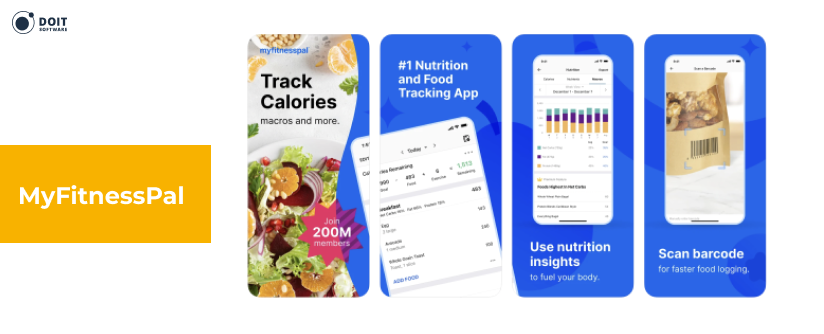
With an impressive 19.1 million users, MyFitnessPal is one of the largest mHealth apps on the market. It is available on Google Play and App Store. The solution encompasses healthcare app features that help users track their activities, calorie intake, sleep, fertility and more. You can choose goals, create meal plans, as well as pair up the app with other fitness tracking devices. The app is also available as a desktop version and offers a large community and support groups for people interested in healthy diets and weight loss.
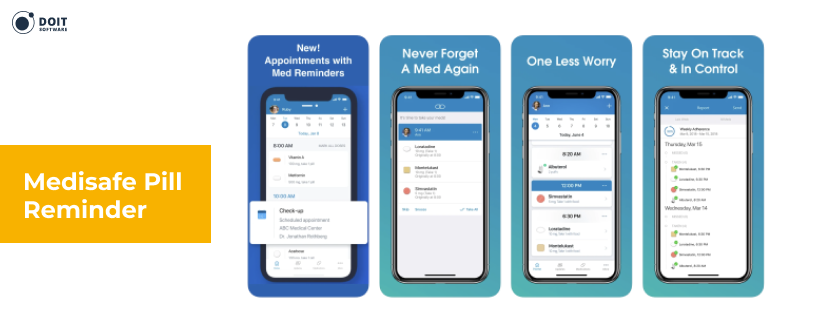
Medisafe Pill Reminder with over 6 million users is available on both Android and iOS marketplaces. The app helps with scheduling doctor appointments for both medical staff and patients. It can also send notifications about upcoming appointments and medications. In addition to visit management features, the app offers health measurements trackers that help patients stay on top of their vital signs.
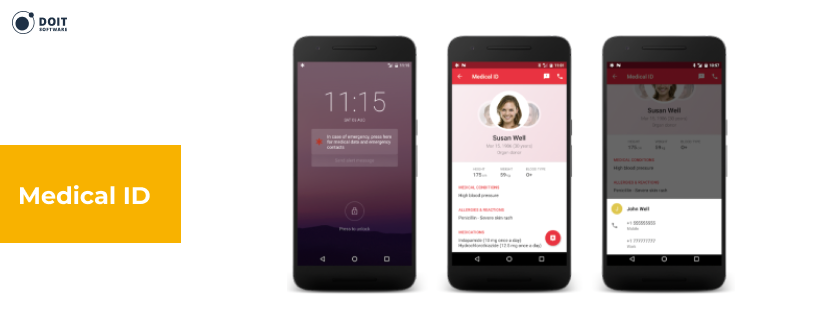
Medical ID is a healthcare Android app with over 500,000 installs that stores all the vital patient information. If a user gets in an accident or suffers a medical emergency, paramedics can look at the app that displays health data right on the home screen. The information can include emergency contacts, blood type, health conditions, allergies, and more.
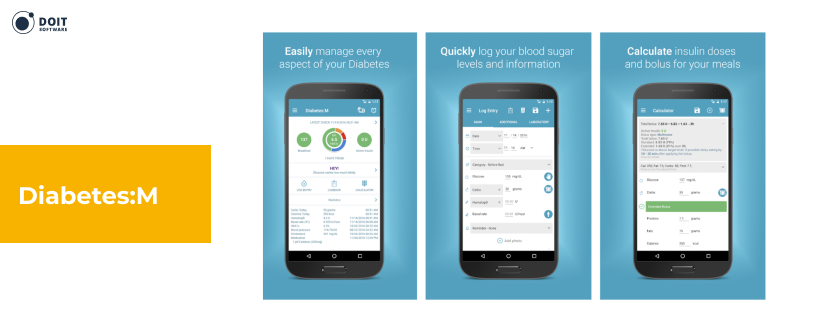
As made clear by the title, Diabetes:M is an application designed for people with diabetes. The app helps more than 50,000 users manage their glucose and insulin levels, track their food consumption and monitor vital signs. Whenever users visit a physician, they can share the data from the app and provide comprehensive reports about their health condition. You can access the application on both Google Play and App Store.
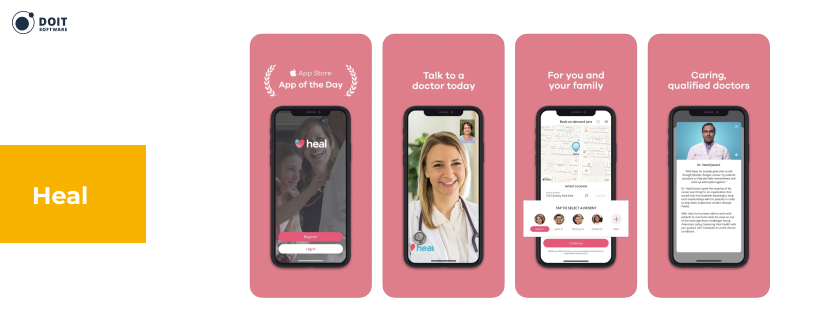
Heal is a medical solution that is available only on iOS. The app gives access to a wide range of certified doctors in various fields. You can arrange an appointment and have your doctor visit you at home. Additionally, you can receive medical help online through video calls. After entering information about your health insurance, you get access to various options and a transparent pricing structure.
Interested in launching a mobile application that connects patients to healthcare workers? Share your idea with DOIT Software to get a quote and start your own iOS and/or Android healthcare application development.
Healthcare application development teams cater to the needs of medical professionals and patients trying to produce apps that solve their pain points. In this section, we will focus on the types of solutions for patients and medical facilities.
Health apps are aimed at the general public and provide medical information and services without a claim on medical evidence. Medical apps are designed for medical professionals and focus on collecting and storing medical data which is why they need to be in compliance with regulations and meet testing requirements. If you would like to launch a health application development process, learn the differences between health and medical apps:
Target audience
General public
Medical professionals
Purpose
Provide health-related information and advice
Offer medical help from certified physicians
Compliance
No compliance is needed
Compliance with regulations and standards is required
Privacy
No access to health records
Access to electronic health records and patient data
Costs of development
$45,000 - $80,000
$80,000 - $120,000
Examples
Fitness trackers, lifestyle apps, health monitoring, medical education
Medical record and prescription apps, telehealth, medical networking
Medical apps are solutions that medical professionals use for their work and include different types of applications. Since these apps require compliance with various standards and certifications, the development cost is quite high. The average cost of medical app development is about $80,000 – $120,000. Let’s break down the most prominent types and learn what problems mobile medical app development intends to solve.
Healthcare application development delivers medical networking solutions that connect physicians to showcase the latest development in the medical sphere, offer job prospects, ask healthcare-related questions and exchange ideas. Basically, these are social media channels specifically targeted at medical professionals. The most known apps involve Sermo, Doximity and Among Doctors, which have thousands of active users.
Medical mobile app development also includes the creation of solutions that simplify invoicing and billing. Apps like AdvancedMD and Waystar streamline the invoicing and billing processes, reduce human errors, and provide secure and fast payments. Medical billing solutions oftentimes come with analytics and business intelligence features that help practices monitor their earnings, extract meaningful insights, and apply their findings to increase revenue.
Medical mobile app developers can also build telehealth applications that help physicians normalize their scheduling and achieve a healthier work-life balance, which has been an issue in the medical profession. At the same time, patients are often reluctant to visit hospitals amidst the pandemic to avoid getting sick and spreading the virus. Using apps like GoodRx Care and K Health allows for smooth and quick connection to patients and to reduce no-shows. Patients can schedule appointments via telehealth apps, both in-person and virtually, whereas clinicians can take advantage of a centralized space with access to all the essential information.
How to develop a medical app that reduces prescription fraud and streamlines the work of both doctors and pharmacists? Applications like iPrescribe simplify and automate prescriptions and digitize the process. Instead of using paper pads, physicians can enter all the information in the app and receive warnings about patients’ allergies and health conditions.
One of the most prominent and in-demand medical app ideas involves collecting and updating medical records through the app. Such applications collect, store, and update patient information such as diagnoses, treatment plans, allergies, vital signs, and more. Applications like Meditab and RXNT offer a suite of various features that help doctors quickly access and edit patient information. This way, nothing gets lost in communication, and physicians are fully up-to-date with their patients’ healthcare information.
If you would like to start medical mobile application development but do not know where to begin, contact DOIT Software to go through the discovery phase and get a deeper understanding of your future product.
We will walk you through the entire process of the healthcare application development and deliver a prototype to test the concept and validate its feasibility, all within a month.
Medical application development for patient health apps is usually significantly cheaper than medical apps as they do not require as much adherence to regulations and guidelines. The average cost for an MVP lies between $45,000 and $80,000. Let’s take a closer look at different types of health apps for patients and determine how they make our lives better, before diving into the health mobile app development process.
If you are contemplating launching mental health app development, then this section is for you. Mental health apps are solutions that allow wide audiences access to certified therapists, relevant information and various techniques like meditation and breathing exercises. Services of offline mental health professionals can be quite costly for a lot of people, and apps like Talkspace and Calm provide affordable alternative solutions. How to develop a mental health app that appeals to users? Aim at building a health app where users can arrange virtual therapy sessions, receive notifications and reminders that help them manage their anxiety, and access the best mental practices.
Healthcare app development also includes eLearning apps that educate the general population, medical students and certified doctors about the field of medicine. By using apps like Medscape and Lecturio, you can learn about the basics and find answers to your questions, as well as read the latest studies and developments in the medical field. Some patients want to learn more about their conditions or simply expand their medical expertise, and medical education apps satisfy this need.
How to develop a health app that helps patients manage medications and be consistent about their usage? The main goal of medication tracking applications is to remind users when to take their medication and to help them follow through with their post-discharge treatment plan. Besides sending notifications and reminders, apps like Medisafe and Mango Health help patients find the most affordable medication in their area. They assess the prices of certain medications in different pharmacies nearby and come up with a comprehensive report. Using drug trackers helps users follow their treatment schedules and take their medication on time.
Mobile healthcare software development companies can produce applications that help users take control of their weight and monitor their eating habits. Apps like Lose It! and WW App offer various features that allow users to monitor their calorie deficit, create a healthy long-term diet and set individual goals. Some dieting apps simplify calorie intake recording by allowing users to take photos of their meals and automatically calculate the number. This use of healthcare apps allows people to change their eating habits and maintain long-term healthy diets.
Mobile healthcare application development companies also deliver fitness applications that help users stay in shape and achieve various workout results. Applications like MyFitnessPal and Sworkit give people access to hours of workout videos, helpful tips for anyone from beginners to professional athletes, as well as the ability to connect with friends and share experiences. Fitness apps help people establish a regular workout routine, get access to personalized trainers and create individual fitness plans that fit their goals, skills and schedule.
Mobile health app development also includes lifestyle apps that are composed of various app types that help people develop healthy habits, calm their anxiety, and improve their quality of life. For example, meditation apps like Meditopia, emotional well-being apps like Exhale, the Clue app that help women track their period and others.
Contact DOIT Software, a mobile healthcare app development company to receive a quote and start building your next app with a team of professionals.
The process of healthcare application development is lengthy and requires rigorous planning. In this section, we will devote some time talking about a step-by-step guide to mobile health application development.
First of all, you need to decide which audiences your app will be catering to. Maybe you would like to optimize drug ordering and delivery, help diabetes patients with managing their condition, create a lifestyle app that gives people advice on how to reduce anxiety and so on. There are quite a few options that you can choose from before you jump into the healthcare application development process. To define your target audience, identify the problem your app will be solving.
After determining your focus audience, make sure to analyze the market and the existing competition. This can be helpful to offer a unique selling proposition, as well as to avoid mistakes that other app creators have possibly made. Techniques like SWOT and PEST analysis are widely used to identify your company’s strong and weak sides and to recognize your potential on the market. If you would like to learn how to develop a healthcare app with higher chances of success, make sure to spend enough time on market and audience research.
Based on the market and target audience analysis, select the type of application you are going to create. As mentioned above, there are a lot of options for both the general public and medical community. First and foremost, you need to choose between medical and health apps since they require different budgets and compliance protocols. This should be done before you begin the healthcare application development process, and select the suitable direction, such as a fitness app or medical prescription solution, etc.
User experience is the focal point of modern mobile medical application development. Not only should you implement the common best practices of the UI/UX design,such as easy navigation and appealing visuals, but also consider inclusivity. This is true as your application will be used by a broad user group, some of which might have certain disabilities. Make sure to make your healthcare app design suitable for people with visual impairments, elderly users, and so on.
Medical mobile app development companies need to pay close attention to compliance. Data protection is a vital step you need to address right from the start. Healthcare information is protected by data privacy laws like HIPAA in the US, GDPR in the EU, and PIPEDA in Canada. Research the guidelines of your country, as well as your target regions, and make sure you comply with them. Exposing or leaking private patient data is a serious offense that can result in reputational and financial losses. Besides that, ensure advanced security measures like end-to-end encryption, two-factor authentication, app expiration and more. End-to-end encryption can be achieved with code signing certificates, it assures users that the code is not modified since it is signed with strong hashing. FHIR resources can also play a significant role in ensuring interoperability and compliance within the healthcare ecosystem. Incorporating a HIPAA compliant chatbot can further enhance data security and privacy, enabling secure communication and access to healthcare information while adhering to regulatory requirements.
Hospital app development cannot work without a reliable monetization strategy. Your monetization model is the deciding point, as it determines how you will be generating revenue. You have four most popular options for app monetization:
The most common model in healthcare application development is subscription-based. Other options are also successfully used, except for the paid model. Most users like to try out a new app before investing any money in it, which is why freemium and subscription models with a trial period included are a better choice.
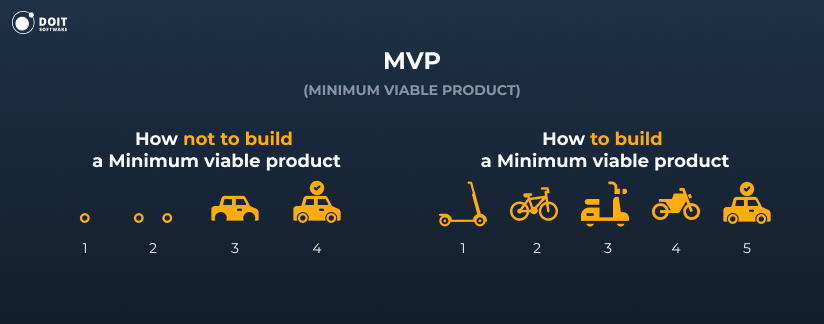
MVP stands for Minimum Viable Product and allows mHealth app developers to create a basic app version. With it, app owners can validate their idea before jumping into a lengthy healthcare application development process. MVP building requires going through all the features and prioritizing the essential or functional ones. These features comprise the functions that are enough to solve the focal problem. For example, in a prescription app, the basic features include a digital prescription pad, connection to the pharmacy management system to send the prescriptions, and access to patient data.
If you do not have a seasoned team on staff, you can hire a healthcare app development company and outsource the whole project or some of the parts. Hiring an in-house team causes significantly more expenses and takes a long time. At the same time, delegating the entire project to a healthcare application development company might result in the loss of control. This is why you should conduct a detailed vetting process and make sure the company is experienced and trustworthy. If you choose a responsive and reliable partner that delivers regular reports and conducts proper planning, you will not lose any control over the project.
Upon the launch of the MVP, collect feedback and include the insights into the next stages of healthcare application development. At this stage, you can expand the features and add non-essential functions to make the app more appealing and unique. However, the most important step is to fix bugs and make sure the essential features are functioning well.
Every medical app development company needs to be aware of the data privacy regulations in their region. Depending on the target location of your health app, you need to ensure compliance with different local privacy laws. Here are some of the most prominent privacy laws:
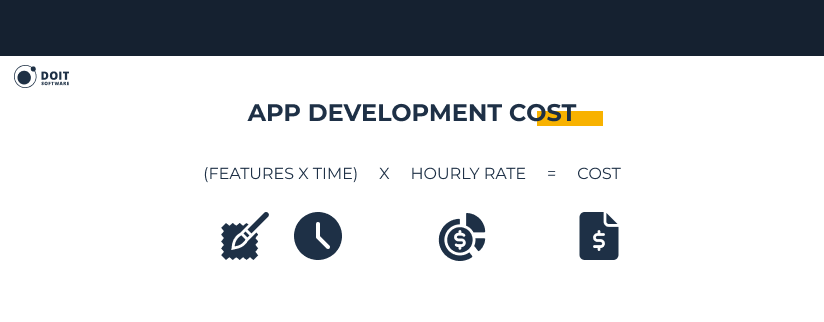
The healthcare app development cost depends on the location of the vendor, the number and the complexity of the features and the application type. Let’s go through the list of features that are essential for an MVP telehealth app.
Registration and login for both patients and physicians
75
$3,750
Profile creation and editing for both patients and physicians
80
$4,000
In-app search engine and filtering options
100
$5,000
Appointment scheduling for both patients and physicians
185
$9,250
In-app messaging, calls and video chats
135
$6,750
Payment gateways
35
$1,750
Admin panel
270
$13,500
Application backend
1100
$55,000
Total:
1,980
$99,000
Take into consideration that the healthcare mobile application development price does not include testing, project management and some other costs. The final healthcare app development cost might be higher.

What are the current and upcoming healthcare mobile apps trends? The following healthcare technology trends can help you in developing a health app that stands out and attracts a wide range of the population.
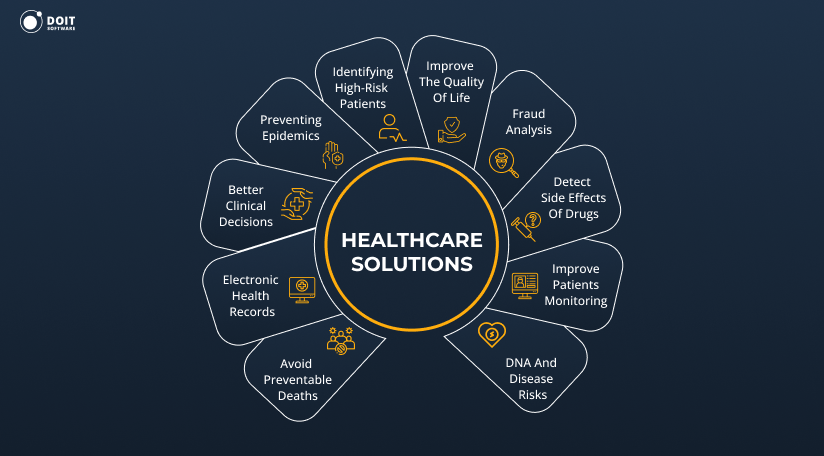
Healthcare application development is the future of both the IT and medical worlds. Digital transformation of healthcare can make great changes to the industry, making it more secure, efficient, affordable and accessible. If you would like to be a part of this shift and create a healthcare application, you can get in touch with DOIT Software, a software development team with years of experience and many successful mobile apps in the pharmacy and healthcare industries. Share your idea to receive a quote and learn more about digital health app development from top healthcare app developers.
Transform your idea into a successful product with the DOIT Software team.
Contact usHealth apps are aimed at patients and can provide different services like medication tracking, mental health exercises, fitness, dieting, etc. Apps that have the biggest user base are Medisafe Pill Reminder and MyFitnessPal.
Depending on the type of healthcare app, they can virtually connect patients to doctors, provide appointment arrangement services, offer workout and meditation plans, and more.
An average healthcare application development duration is about 5-9 months.
An MVP can cost somewhere around $60,000 to $100,000 but with the addition of extra features, the price can go up to $150,000 and more.
You can start by asking your peers for a recommendation or scanning the internet for the most competent best healthcare app developer in your industry. Visit the homepage to check out their portfolio and review their testimonials.
To find the best healthcare app development company, don’t be afraid to vet the potential vendor and ask them all the important questions to make sure they are professional, responsive and reliable.
Pitch your idea to developers, get a quote and discuss further details over a meeting or call. After discussing all the details, sign the contract and set up the start date of the project development.










